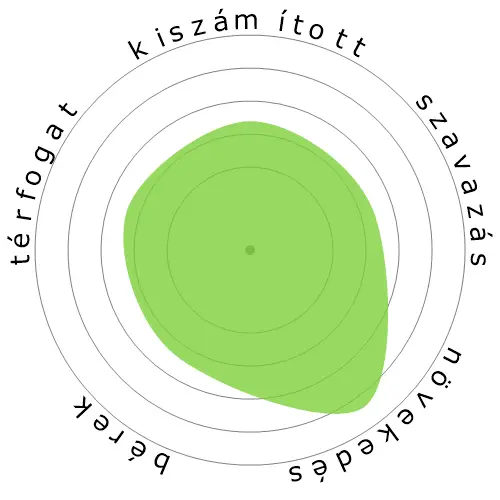Légi utaskísérők




Az emberek ezt is megtekintették
Számított automatizálási kockázat
Alacsony kockázat (21-40%): Ennél a szintnél a munkák csak korlátozottan vannak kitéve az automatizálás veszélyének, mivel ezek a pozíciók technikai és emberközpontú készségek kombinációját igénylik.
További információ arról, hogy mi ez a pontszám, és hogyan számítják ki, elérhető itt.
Felhasználói szavazás
A látogatóink szerint alacsony az esélye annak, hogy ezt a foglalkozást automatizálni fogják. Ezt az értékelést tovább erősíti a kiszámított automatizálási kockázati szint, amely 38% esélyt becsül az automatizálásra.
Mit gondol, milyen kockázatai vannak az automatizációnak?
Milyen valószínűséggel fogják Légi utaskísérők robotok vagy mesterséges intelligencia helyettesíteni a következő 20 évben?
Érzelem
A következő grafikon mindenhol szerepel, ahol jelentős mennyiségű szavazat áll rendelkezésre, hogy értelmes adatokat lehessen megjeleníteni. Ezek a vizuális ábrázolások az időbeli felhasználói szavazási eredményeket mutatják, jelentős jelzést adva a hangulat trendjeiről.
Érzelem az időben (évente)
Növekedés
A(z) 'Flight Attendants' munkahelyi nyitások száma várhatóan 9,9%-kal nő 2033-ra.
Teljes foglalkoztatottság és becsült állásnyitások
A frissített előrejelzések 09-2025 időpontban esedékesek..
Bérek
A(z) 2023-ban a 'Flight Attendants' éves középfizetése 68 370 $ volt, vagyis 32 $ óránként.
'Flight Attendants' magasabb összeget kaptak, mint az országos mediánbér, ami 48 060 $-n állt.
Bérek az idők folyamán
Térfogat
2023 időpontjában 126 020 ember dolgozott 'Flight Attendants' munkakörben az Egyesült Államokban.
Ez körülbelül a 0,08% -át képviseli az országban foglalkoztatott munkaerőnek.
Másképp fogalmazva, körülbelül minden 1 ezer. ember 'Flight Attendants'-ként dolgozik.
Munkaköri leírás
Figyelje a repülőgép kabinjának biztonságát. Szolgáltatásokat nyújt a légitársaság utasainak, magyarázza el a biztonsági információkat, szolgál fel ételeket és italokat, és reagál a vészhelyzetekre.
SOC Code: 53-2031.00


Megjegyzések
Leave a comment
Plus, robots can't do such things as CPR or use a first aid kit, for example. So, it's pretty risky.
And by the way flight attendants are there to save u not to make u happy.
First priority is safety the If it’s possible the service time will come.
Given the recent horrific experiences passengers had to endure from these "flight attendants", I see machines replacing these incompetent humans in the future. It'll save the airlines plenty of revenue and avoid lawsuits and having to pay these poorly trained service attendants for mediocre to dismal services provided.
The only ones to blame would be the flight attendants themselves, because a machine did a better job than they ever would.
For example,
Today : 10 human flight attendants
Future: 1-3 human flight attendants, 7+ robot flight attendants.
Capish? :P
I have witnessed a decline in the manners and decorum of the passengers traveling. Possibly, the added stress to passengers of airport safety procedures has taken a toll on their nerves. I remember when friends and family could accompany passengers to the gate. Now, the seats are packed in like sardines in a can.
Airline competition made the way for no-frills service and more passengers in smaller seats on airplanes. This has taken a toll on everyone's stress levels. Still, I see friendly FAs who are doing their best to accommodate everyone onboard and assuage those who are already frazzled by the time they take their seats.
A robot may make the dispersion of in-flight commodities easier but it can never take care of all of the emergencies that FAs are trained to handle, the medical emergencies, the duplicate and other seating problems, the myriad of human interactions that FA's handle, unaccompanied children, wheelchair passengers, interaction with cockpit and ground staff, etc., etc. the list goes on, not even considering a major emergency like a hijack incident.
You have vastly underestimated the uber-selective hiring, initial and ongoing training that FAs have. Did you know that they have to take FAA-mandated emergency testing yearly on every airplane which they are qualified to work and pass the test with a 90-100% grade. This includes physical testing in airplane simulators., first aide, resuscitation and cardio procedures etc.
If you see an FA behaving in the unprofessional manner you have described, you should write a letter to the airline about that employee.
Hagyjon egy választ erről a foglalkozásról